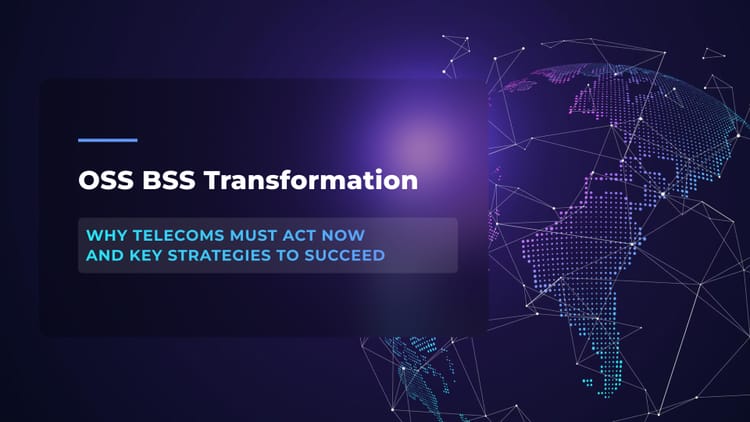Overcoming the Challenges of Implementing a CRM for Telecom: Our Journey to Building a Custom Solution
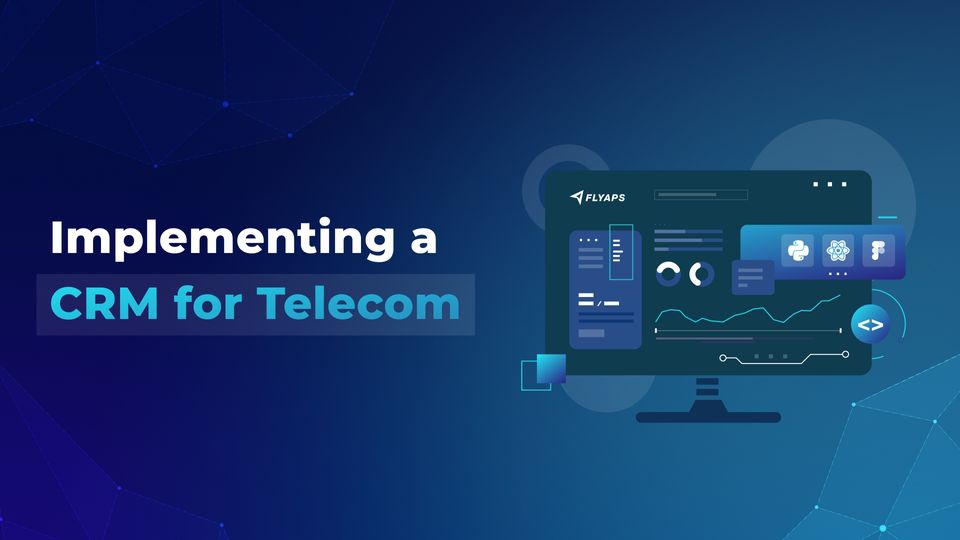
Managing customer journey effectively has always been one of the greatest challenges for telecom companies. Suppose, your contract management is handled in one CRM system, while your CPQ and order management systems are handled separately. This disconnection makes room for gaps in your sales process. As a result, you face difficulties in delivering quality service and accurate cost estimates to your customers.
However, with a custom telecom CRM system tailored specifically to your needs, you can make sure this scenario won't happen. Surprisingly, custom CRM software can even be more cost-effective than customizing off-the-shelf options. It can be equipped with tools and features that replace software you currently use and pay for.
At Flyaps, we have a decade of experience in the telecom industry behind our backs. We've witnessed how custom-made telecom CRM systems have revolutionized business workflows, improved customer satisfaction and overall experiences, and reduced costs for many enterprises in the long run.
In this article, we will share a real-life example of one of our clients, NetSpark IP & Telecom. Before reaching out to us, the company was looking for ready-made solutions to address their clients' needs, but couldn't find any suitable ones. In just three months we helped them build a highly performative CRM/ERP system that let them minimize manual labor, enhance team productivity, and drive revenue growth.
But before we dive into this story, let's discuss why CRM implementation is such a big problem for telcos.
Why is it so challenging for telcos to implement a customer relationship management solution?
Surveys and studies conducted by Gartner and Forrester have found that from 30% to 70% of CRM projects fail to achieve their desired outcomes. This data includes various industries, one of which being telecom. Despite the fact that customer relationship management software is incredibly important for telcos and provide a range of benefits, implementing them is quite challenging for some telecom providers.
Though all telecom companies have their unique needs and it's impossible to cover all the reasons why each particular case failed, we can still highlight five of the most common ones. Take a look below.
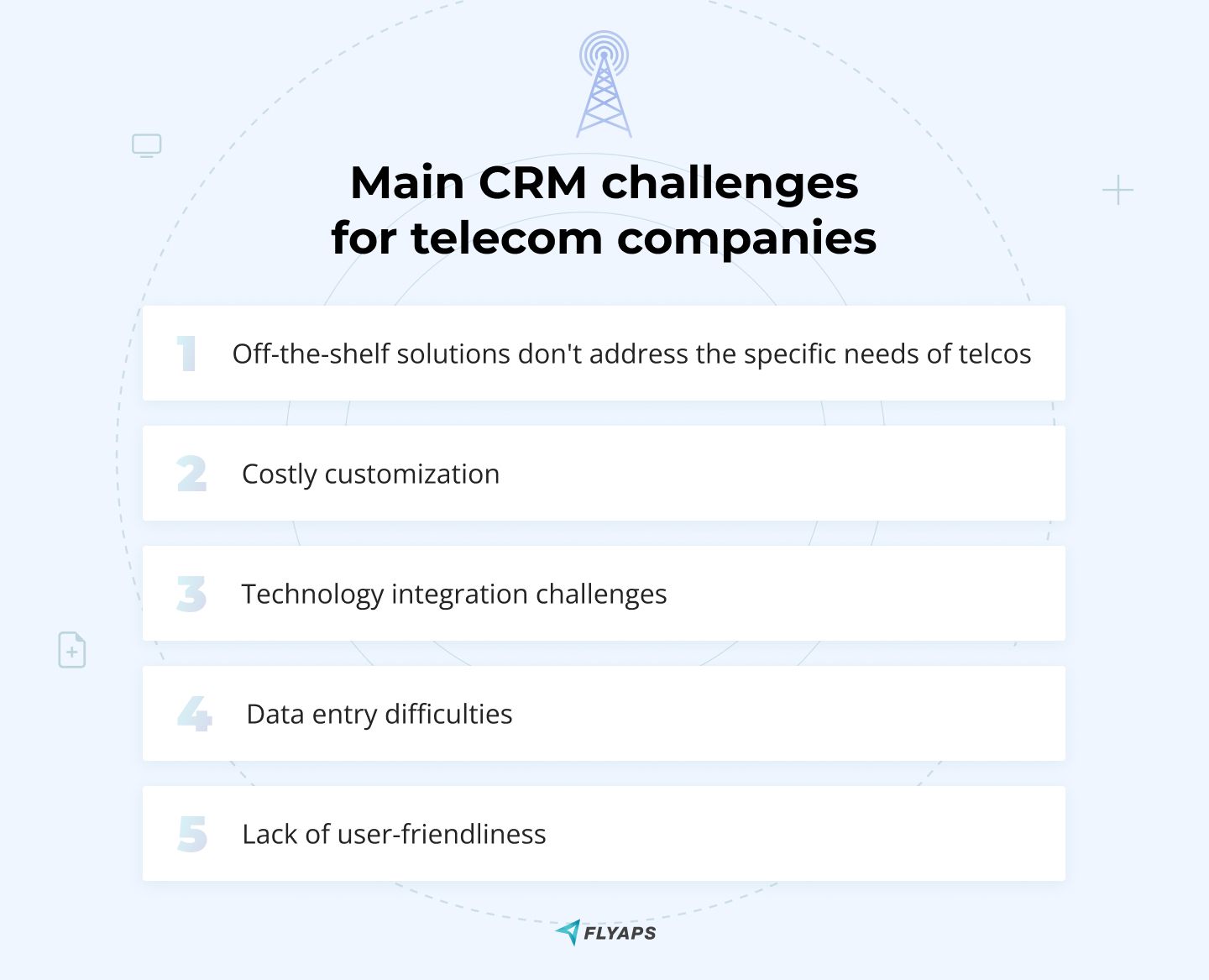
Off-the-shelf solutions don't address the specific needs of telcos
Imagine a telecom operator that wants to streamline their operations and decides to implement ready-made CRM software. This software is popular across various domains and comes with important features like contact management and email integration, which are crucial for the company's daily operations.
However, there are industry-specific needs that the CRM software doesn't fully address, even though it has the potential to simplify and automate many important processes in the telecom industry specifically. For example, the company struggles to accurately track the real-time availability and utilization of their network equipment. Without this crucial information, optimizing their resources and responding promptly to customer demands becomes quite troublesome. Furthermore, the ready-made CRM system lacks comprehensive network planning and design capabilities, hampering the company's ability to efficiently expand their infrastructure. The outcome? Low customer satisfaction and additional workload for company employees.
After recognizing the limitations their current off-the-shelf solution has, our imaginary team would sooner or later start looking for a new CRM software for their telecommunication company that can come as close as possible to fulfilling their specific requirements. It proves to be a challenging task to find a suitable solution. Moreover, they compare the costs of subscribing to customer relationship management software and other crucial tools with the cost of developing a fully customized system. Ultimately, they would decide to opt for developing a custom CRM system, as only this way the company would make sure their system adequately supports their network inventory management, network planning and design, as well as field service management.
Telecom companies often face a tough choice between using ready-made solutions or creating their own custom CRM system. Those who go for off-the-shelf options might later find themselves searching for new CRM software that can meet their specific needs. Unfortunately, this process can be both difficult and costly compared to the companies that decide to develop their own CRM platform from the beginning.
However, opting for a custom solution has shown to be a smarter financial and time-effective decision in the long run. It allows telcos to effectively address any unique requirements and fully support various cross-company activities such as network inventory management, network planning and design, and field service management.
From cloud migration to telecom-specific AI solutions, we have delivered over 20 projects that are used by hundreds of MNOs and telecom companies worldwide. Check our capabilities and let’s discuss your next solution.
See our servicesCostly customization
Even ready-made solutions can be customized, you'd say. And you're more than right. But there's a catch: customization of these solutions can be quite expensive and comes with certain limitations. Let's look at one example.
Imagine you're a business owner of a growing telecom company, and you decide to employ an off-the-shelf CRM system and tweak it to handle complex pricing structures and provide real-time service availability information, which are crucial for your business. But modifying the system to accommodate your unique workflows and processes becomes a real challenge. Each customization request comes with extra costs, driving up the implementation expenses significantly.
Why does this happen? The reason is pretty straightforward. The chosen off-the-shelf CRM system, as all similar products, was designed as a universal tool for many domains, without any particular focus on telecom industry. So, trying to adapt it to meet your specific needs becomes a time-consuming and costly endeavor. You find yourself constantly collaborating with external developers and conducting extensive testing to make sure the system functions as it should.
In the end, despite investing a considerable amount of time and resources, your company realizes that the customized CRM software still falls short of your expectations. The limited customization options prevent your company from achieving the desired level of efficiency, customer satisfaction, and operational effectiveness. It's frustrating, to say the least.
Technology integration challenges
It is a common case for telecom operators to have vast technology infrastructure consisting of various systems for network management, billing, customer data coming from the customer support department, and more. Let's say one such company recognizes the need for a CRM system, but finds it problematic to integrate the CRM with their existing technology infrastructure.
The network management system of telecom companies, such as the one we discuss, has to collect vast amounts of data on network performance and customer usage patterns. Meanwhile, their billing system generates invoices and tracks payment information. Additionally, the company's customer support system handles inquiries and tracks customer interactions. Without proper integration, these systems operate independently, leading to data inconsistencies and fragmented customer information. Leveraging AI development platforms can greatly facilitate this integration by enabling intelligent automation, predictive analytics, and real-time data synchronization across these complex systems.
Implementing AI strategically can significantly ease this process, enabling intelligent automation, predictive analytics, and real-time data synchronization across these complex systems.
For example, when a customer contacts their support team to report a network issue, the support representative lacks real-time visibility into the customer's network status. They must manually gather information from different systems, which leads to delays in resolving the issue and customer frustration. Furthermore, the billing system may not reflect the correct charges for the affected service, causing confusion during the invoicing process.
What's the way out of this situation? To address these challenges, the company can turn to a software development company with experience in the telecom industry. The software development company, in turn, conducts a thorough analysis of telco's technology infrastructure and business processes to develop customer relationship management solution tailored to the company's needs.
Drawing on their expertise, the software development company designs a custom telecom CRM software that seamlessly integrates with their existing systems. This custom telecom CRM solution acts as a central hub, pulling customer data from the network management system, billing system, and customer support system in real-time. The integration allows the telco's employees to access comprehensive customer information, including network status, billing details, and support history, all from a single interface.
Overall, the integrated telecom customer relationship management system enhances workflow efficiency, improves data consistency, and provides a unified view of customer interactions, which all leads to better customer satisfaction rates.
Customer data entry difficulties
Let's consider an example of a telecom operator that offers a wide range of services, including mobile, internet, and landline, serving millions of customers worldwide. Previously, they relied on manual data entry processes to input customer information, service activation details, and billing data into their separate CRM and ERP systems. However, this approach proved to be time-consuming and error-prone, leading to data quality issues and financial losses.
To overcome these bottlenecks, the company decided to partner with an experienced software development company specializing in telecom solutions. This company analyzed the telco's existing customer data sources, which included customer sign-up forms, service activation requests, billing information, and support interactions.
Then, the software development company proposed an automated data entry solution that integrates the telco's various data sources directly into their CRM and ERP systems. For instance, customer sign-up forms were integrated with the CRM software, eliminating the need for manual customer data entry. Similarly, service activation requests and billing information were automatically synchronized with the ERP system, ensuring accurate and up-to-date records.
The integration of data sources reduced manual effort, minimizing the risk of human errors and improving data accuracy. Customer data, such as service activation details and billing data were seamlessly captured and synced across systems, providing a holistic view of each customer's journey.
Lack of user-friendliness
No matter how feature-rich the CRM system is, if users cannot understand how to use it effectively, all efforts put into developing the system will be worthless. This is where good UX design in telecom becomes essential.
Let's say a telecom company has a custom telecom CRM software that boasts of numerous features to streamline their operations. But its employees found themselves struggling to utilize the system effectively, and frustrations grew among both the staff and the management.
Recognizing the importance of good UX design, the telco decided to invest in improving their CRM system's user experience. They hired a team who conducted extensive research to understand the users' expectations and how they actually used the system. They interviewed employees, observed their workflows, and collected valuable insights about their pain points and needs.
Armed with this knowledge, the UX designers set out to create a better user experience. They developed user flows and customer journey maps, outlining the optimal paths for different tasks and processes within the customer relationship management system. They also built interactive prototypes, allowing the employees to provide feedback and iterate on the design.
With the improved UX design in place, the telco started witnessing the benefits. Contact management and lead tracking became more efficient. The sales team could easily follow up with leads, ensuring that no potential customers fell through the cracks due to inconsistent follow-ups. This resulted in a more streamlined sales process, boosted the conversion rate and increased revenue.
Additionally, the employees saved valuable time. The simplified workflows and intuitive interface allowed them to navigate the CRM system effortlessly, without wasting time figuring out complicated processes. They could now focus more on achieving their business goals, such as closing deals and providing excellent customer service.
The advantage of a custom solution also became evident when they realized they could continuously improve the UX. Even if UX wasn't the initial focus, the flexibility of their custom solution allowed them to make iterative enhancements without rebuilding the entire system. This adaptability ensured that the customer relationship management system could evolve alongside the changing needs and expectations of the users, resulting in an optimized and user-friendly experience for the employees at the company.
But enough with theory, it's about time we show you some practical stuff. Below we share our personal case of how our team managed to help NetSpark IP & Telecom unlock the full potential of CRM in telecom.
Success story: how Flyaps helped NetSpark build custom telecom CRM/ERP system to automate business processes
NetSpark IP & Telecom is a telecommunications consulting company based in the US. Before reaching out to us for developing a custom system, they didn't have any automated solutions or even a CRM software in place, making their employees perform all the operations manually. One particular challenge they encountered was figuring out the best tariff plans for each client. It was a complex task that required the involvement of multiple employees, while there was still a lot of room for mistakes.
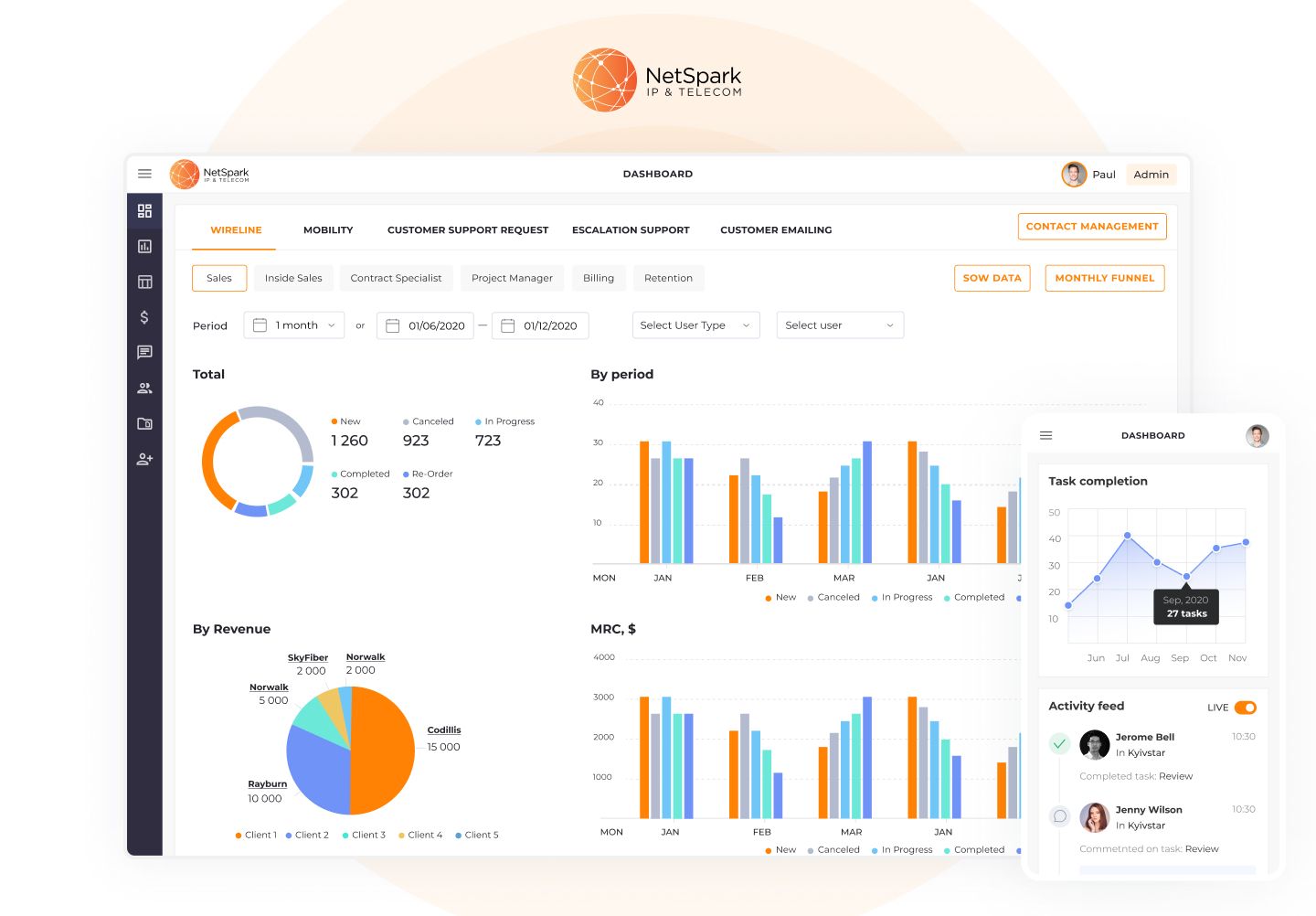
As their business started growing rapidly, NetSpark IP & Telecom realized they needed an automation solution for customer management. They analyzed all the ready-made CRM applications available on the market, but none of them met their specific needs. So, they decided to build a custom telecom CRM/ERP solution. The only problem was that they didn't have the technical expertise in-house. That's when they sought help from Flyaps.
To create a solution that perfectly fit NetSpark's needs, Flyaps worked closely with Netspark's heads of departments. Together, we carefully mapped out NetSpark's business processes and created detailed technical specifications for the project.
To simplify the release process, our DevOps engineer implemented CI/CD pipelines. This automation practice enabled our development team to consistently deliver top-notch builds, resulting in a smooth and efficient development cycle. Understanding the importance of NetSpark IP & Telecom interactions with wireline customers, Flyaps meticulously designed the CRM/ERP system to cater to various user roles with different levels of access rights. This thoughtful approach ensured that all NetSpark employees, customers, and sub-agents could take advantage of the system's features, while maintaining their specific access rights.
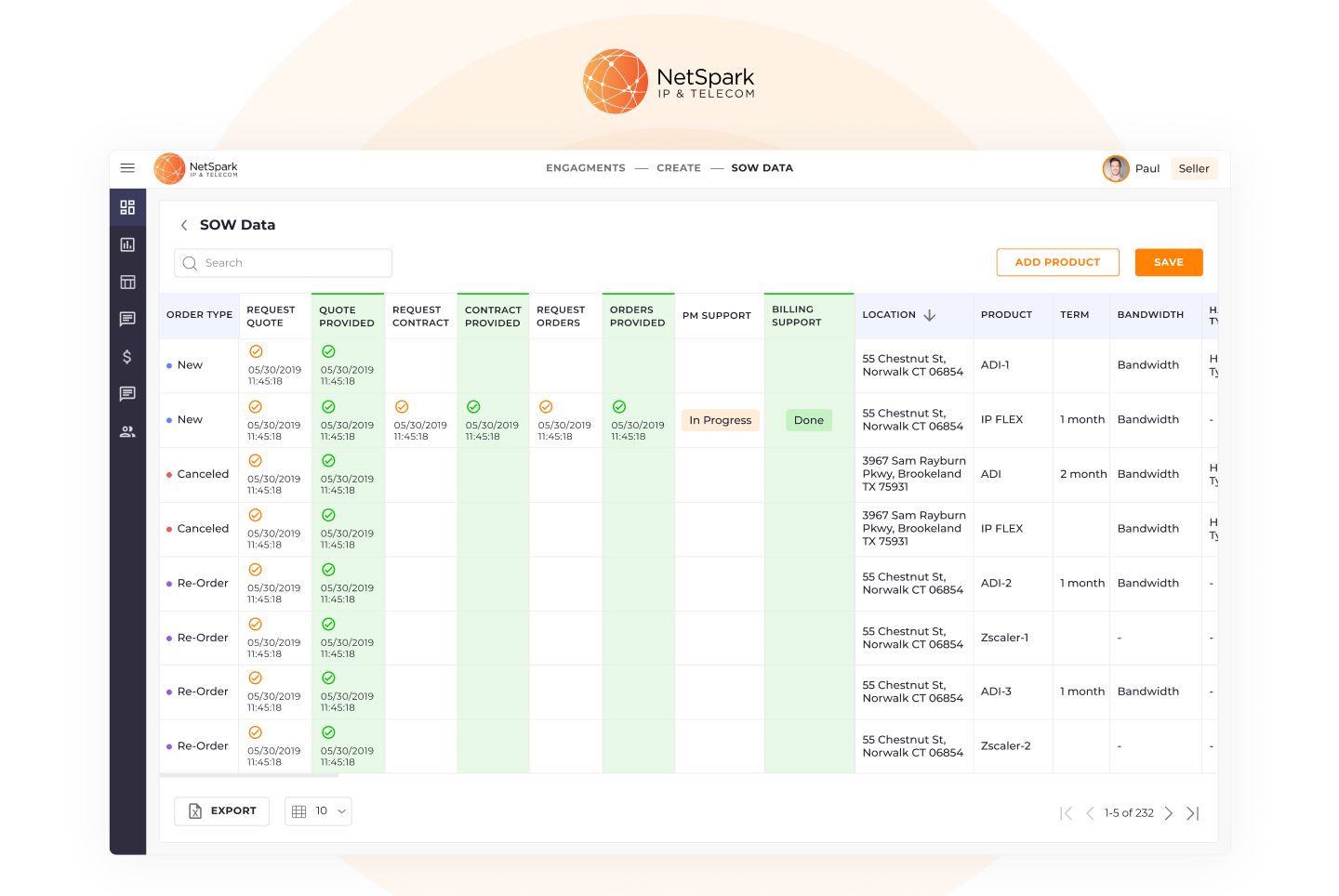
One of the key features of the CRM/ERP system was a cutting-edge calculation tool based on robotic process automation (RPA). This tool simplified the task of finding the best tariff plans for each client, making the process lightning fast and error-free. What used to take three days to complete can now be done in just five minutes. As a result, the process became fully automated with a new CRM/ERP solution.
Within three months, we launched the first version of the telecom CRM/ERP system. As soon as it went live, NetSpark IP & Telecom experienced a remarkable transformation. Manual workloads were significantly reduced, team performance improved, and revenue increased as a direct result of the system being seamlessly integrated into their operations.
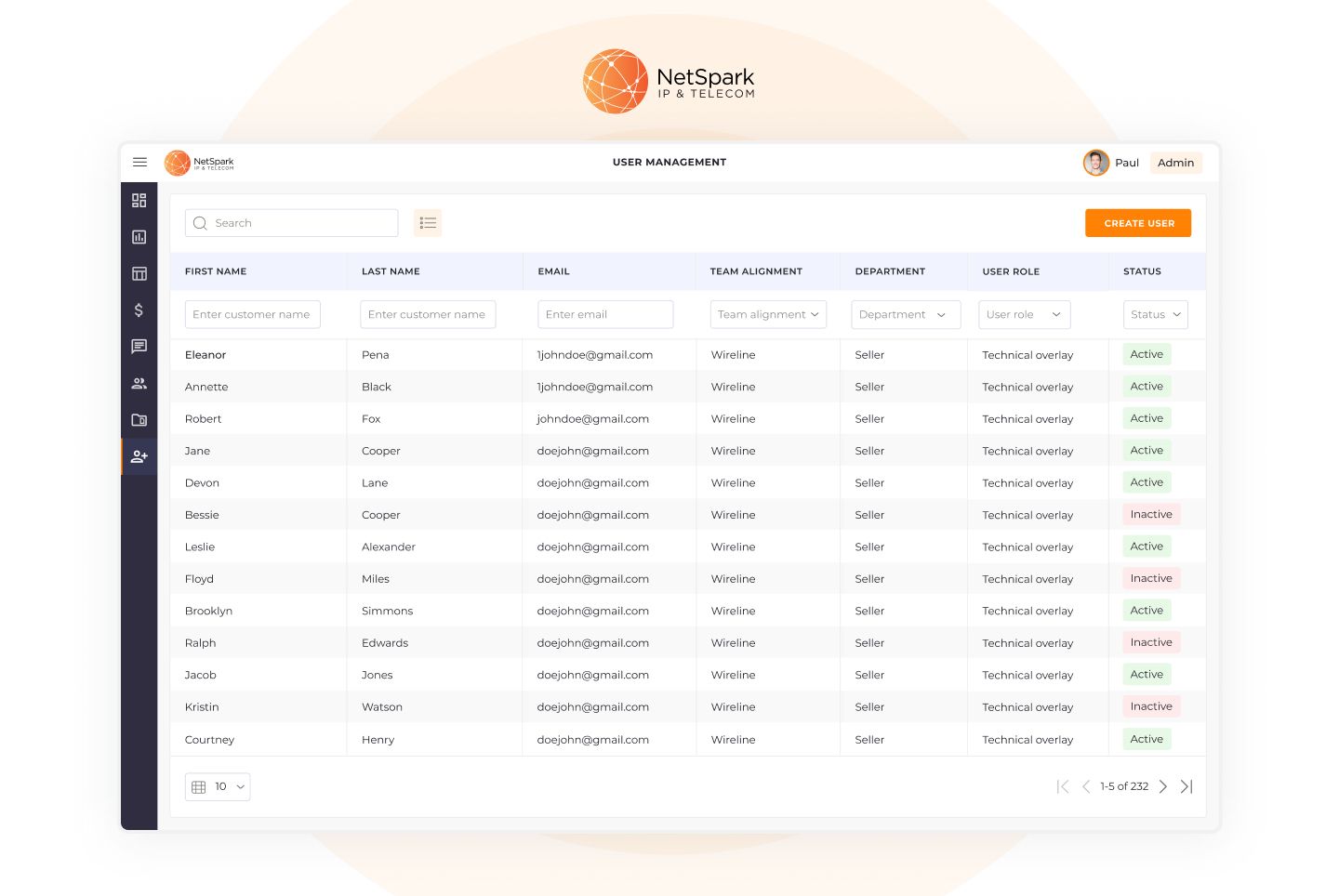
How Flyaps can help you with custom CRM development for telecom
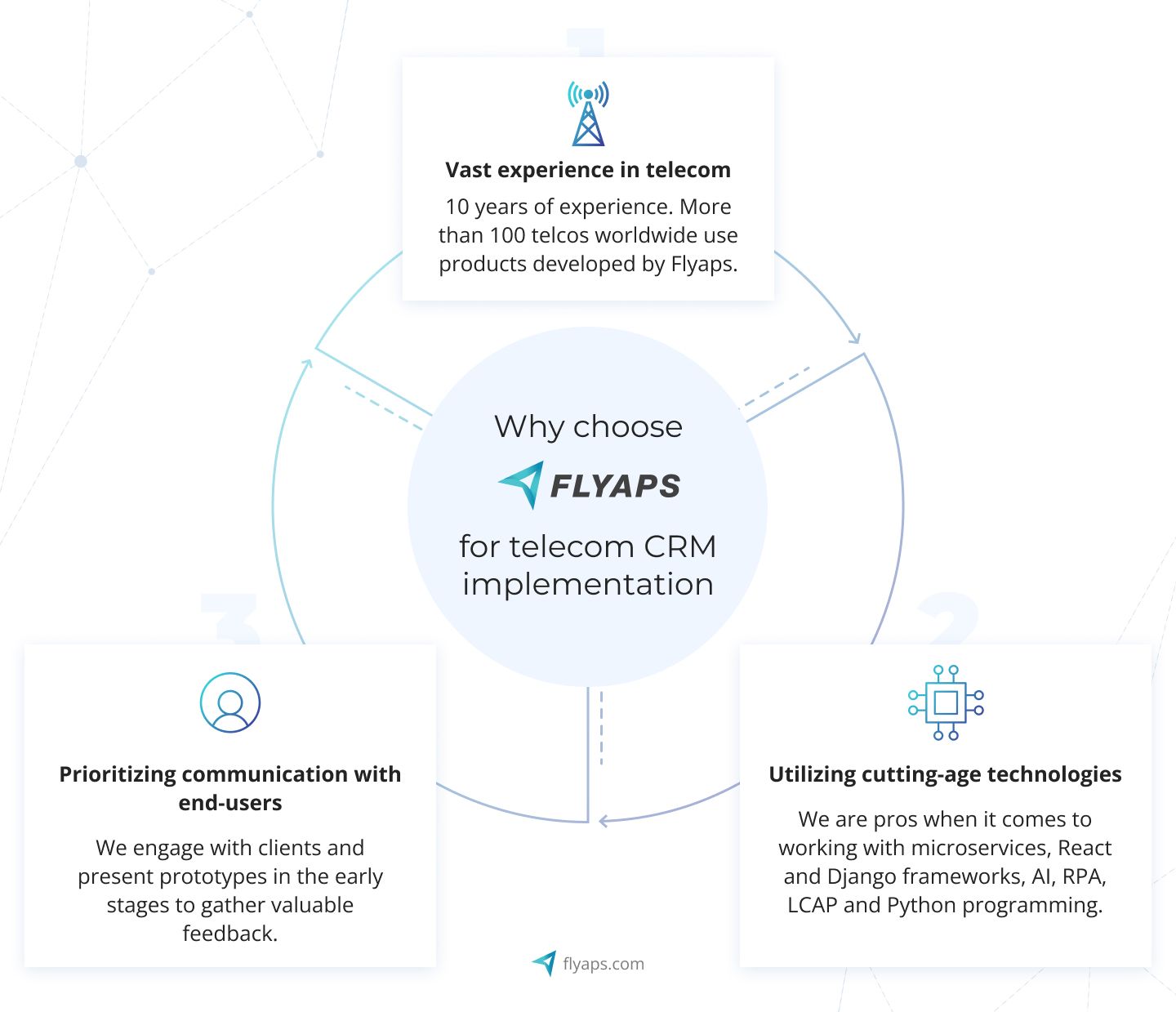
At Flyaps, we understand the unique challenges faced by telecom companies in today's rapidly evolving market. That's why we have been dedicated to providing tailored software solutions since 2013.
But what sets us apart and makes telcos choose us? Here are a few reasons:
Expertise: With a proven track record of developing products that are used by more than 100 telecom companies, including major industry leaders like Orange Group, our expertise and experience are undeniable. Over the past decade, we have closely collaborated with various telecom organizations, gaining deep insights into the unique challenges and specific requirements of the telecom industry.
Utilizing cutting-age technologies: Flyaps leverage advanced technologies like AI, RPA, and LCAP to facilitate agile and flexible development. Our AI and ML developers has a lot of experience with microservices and building custom-made solutions using React and Django frameworks. We specialize in Python to deliver innovative and top-notch results.
Prioritizing communication with end-users: At Flyaps, we believe that communication is crucial for success. We engage with telecom businesses and present prototypes of their products in the early stages of development. By involving end-users, we gather valuable feedback and ensure that the final solution meets the specific needs and expectations of our client and lets them improve both employee and customer satisfaction.
Need help with developing a custom CRM solution for your telco? Look no further! Drop us a message to gain a trusted partner committed to your success.



